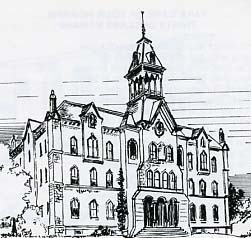
Click Here to Return To Milestones Vol 10 No 2
Geneva College originated in New Richland, Ohio, near Northwood, where the Covenanter Church was located. Through the efforts of James Stewart Johnston and his brother, Reverend John Black Johnston, seven young men formed a class which was taught by the Reverend Johnston.
As the class grew the students were moved into the nearby Covenanter Church. In 1847 the church authorized Pastor Johnston to build a college with materials and money he could gather. He built a fiveroom, two-story, brick building. On April 20, 1848, he opened the college, called Geneva Hall, using two theological students from Westmoreland College to assist him.

There were forty-two students, mostly boys. Tuition was $8 per half year. Session and board was $1 a week in nearby homes. By 1868 there were nearly one hundred students and the faculty had increased. By 1871 the enrollment was down to fifty. In the spring of 1850, a charter was obtained, including an Act of Incorporation by the General Assembly of the state of Ohio. The charter, however, did not conform to the Presbytery view of the purpose of the school. Therefore, the relationship between the Presbytery and Geneva Hall was dissolved.
The school then became a Community project. Its board was composed of members of the various types of Presbyterian Churches rather than strictly Covenanters. About this time most of the girls from Geneva Hall decided to attend the newly-erected Female Seminar in the same town.
The student enrollment of the College was also affected by the Civil War during which the school closed down. Recovery was slow following the war but the school eventually recovered. In 1883 the name Geneva Hall was changed to Geneva College.
By the 1873-1874 term the enrollment had increased to a peak of one hundred and seventy students.
Many persons felt that Northwood was not a location which could draw students and this inhibited future growth. It was decided to move the College.
Several locations were offered. Beaver Falls, Beaver County, Pennsylvania offered, through the Economite Society, to provide ten acres and a suitable building. The offer was accepted.
One of the reasons the Economites invited Geneva to come to Beaver Falls was to provide educational benefits for the emerging industrial towns of Beaver County.
Beaver Falls was described in the school catalog in 1880 as "a live progressive town of six thousand inhabitants, easily accessible in all directions by three great lines of railroads."
The College was on the hill on the extreme northern side of the town, just beyond the city limits. There were only twelve buildings on College Hill, including seven stables.
Enrollment had dropped to forty students after the move from Northwood. However, the enrollment increased to seventy-seven, thirty-eight of whom were from Beaver Falls. Seven of the faculty members moved to Beaver Falls and established their homes there. These men, including the president, H.H. George, taught all the classes, often with limited equipment.
The first graduating class of Geneva College in Beaver Falls consisted of six persons - Ellen M. Johnston, Marshall R. Boals, R.M. Downie, James A. Milligan, W.E. Paxton and Joseph H. Wylie, but oversix thousand people turned out for the graduation ceremonies.
Most activities in Beaver Falls stopped, shops closed and many brought picnic baskets and settled in for an afternoon of orators and entertainment in the warm June sun. A special platform was erected in a grove on the campus overlooking the Beaver River. Old Main was opened in September 1881.
During the remainder of the century, Geneva College took root in the county and by 1899 the enrollment had risen to two hundred and six. About half the enrollment came from the valley. Some of the future leaders of the Covenanter Church included students from such families as Wylie, McBurney, Coleman, Dodds, Martin, Robb, Mcissac, McFarland, George and Johnston.
By 1900 there were many additions to the academic courses offered. These included physics, 1881; music, 1882; psychology, 1887; and physical education, 1893.
The annual cost, including room and board and tuition at $30 per year, ranged from $136 and $299.
The end of the nineteenth century saw Geneva College firmly established in Beaver County.
An historical marker was placed at Geneva College on October 18, 1975 by the Beaver County Historical Research and Landmarks Foundation.